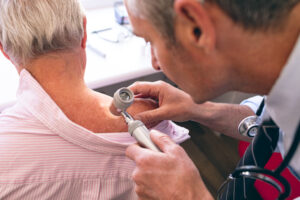Tinnitus, often referred to as ringing in the ears, is a prevalent condition among veterans that can have a significant impact on their daily lives. So what is the relationship between tinnitus and veterans disability? Leah Bucholz provides valuable insights into the connection between military service, noise exposure, and tinnitus.

Understanding Tinnitus and Its Origins
Tinnitus is commonly associated with exposure to loud noises, such as gunfire, explosions, or machinery sounds, which are prevalent in military environments. Tinnitus is often a result of acoustic noise exposure, leading to a ringing sensation in the ears. This condition can manifest after hearing loss or as a secondary effect of other factors. Veterans can seek service connection for tinnitus, with the disability rating maxing out at ten percent.
The Role of Noise Exposure in Tinnitus
Leah Bucholz introduces a comprehensive Excel spreadsheet that outlines the Duty MOS (Military Occupational Specialty noise exposure levels. This spreadsheet categorizes noise exposure into high, moderate, and low probabilities based on MOS, branch of service, and military status (officer or enlisted). For example, combat arms MOS in the Army, such as infantry or artillery, often have a higher probability of noise exposure, increasing the likelihood of tinnitus.
However, it’s crucial to note that high probability does not guarantee automatic approval for service connection. Additionally, those with low-risk MOS may still experience excessive noise exposure, emphasizing the need for individual assessments when filing for service connection.
Examining MOS Categories and Tinnitus Risk
Leah Bucholz breaks down the MOS categories for different branches of service, providing examples of highly probable, moderately probable, and low probability MOS related to noise exposure. For instance, in the Army, combat engineers, artillery repair personnel, and infantryman are classified as highly probable, while medical specialists, logistics specialists and administrative specialists may not.
Furthermore even those with low probability MOS can develop tinnitus due to exposure to acoustic noise trauma during active duty. Various roles, including supply personnel and administrative positions, are not immune to noise exposure, challenging the assumption that only combat-related MOS are at risk.
Veterans Disability Claims for Tinnitus
There are many complexities when considering veterans disability claims related to tinnitus. It is always vest to seek expert consultation with accredited legal professionals like veterans service officers, accredited claims agents and accredited attorneys. While the MOS noise exposure level spreadsheet provides a guideline, the approval process is not black and white. Veterans may face challenges, especially when applying for service connection many years after their active duty.
Secondary Causes of Tinnitus
Tinnitus may not solely result from noise exposure. Secondary causes, such as neck trauma and TMJ issues, can also contribute to the development of tinnitus.
Conclusion
In conclusion, tinnitus is a prevalent condition among veterans, and its connection to noise exposure during military service is a crucial aspect of disability claims.
Also read: Why you Should seek Assistance for VA Claims
At Prestige Veteran Medical Consulting, a veteran-owned company, we specialize in Independent Medical Opinions (IMOs) known as Nexus letters.
Our purpose is to empower YOU, the veteran, to take charge of your medical evidence and provide you with valuable educational tools and research to guide you on your journey.
Understanding the unique challenges veterans face, our commitment lies in delivering exceptional service and support.
Leveraging an extensive network of licensed independent medical professionals, all well-versed in the medical professional aspects of the VA claims process, we review the necessary medical evidence to incorporate in our reports related to your VA Disability Claim.
Prestige Veteran Medical Consulting is not a law firm, accredited claims agent, or affiliated with the Veterans Administration or Veterans Services Organizations. However, we are happy to discuss your case with your accredited VA legal professional.













